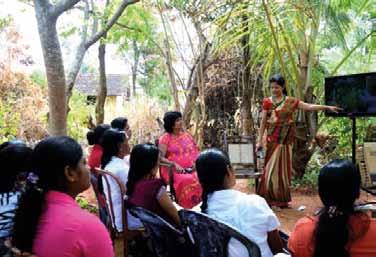
Description of the project: The Jalavahini programme builds the capacity of women community leaders in climate change resilience via a series of interactive trainings. The capacity building activity introduces water-friendly approaches in climate change adaptation. So far, 15 programmes have trained 300 rural women leaders in seven regions all across Sri Lanka. They were trained on climate change adaptation and disaster risk resilience, enhanced food security through eco-friendly agriculture and non-toxic home gardening, and the use of modern and appropriate water conservation and agriculture technologies. The programme provides livelihood security for communities, especially female headed households.
Climate Impact: Sri Lanka oscillates between floods and droughts with extreme weather events taking a high toll on communities. High use of chemical pesticides and weedicides in agriculture leads to the loss of soil fertility which is compounded due to extreme events. The Jalavahini programs led to a pilot project targeting the development of a year round supply of food from home gardens through eco-friendly organic agriculture. Jalavahini promotes user friendly simple techniques to be carried out through the dry seasons. Droughts are combatted with simple irrigation techniques using buried pots. Simple drip lines simulate expensive drip irrigation systems. Enhanced knowledge leads to best crop selection and improves post-harvest management. Jalavahini’s yield is strong and empowers women which makes them game changers in community-level climate change adaptation.
Gender Impact: Jalavahini builds a two-way linkage channeling knowledge of women water professionals to support community women. The programme builds on existing skills and strengths of women leaders to develop and implement water and food/agriculture related activities, strengthen their leadership and organizational skills and ultimately improve their livelihood security in a climate threatened scenario. Supporting livelihood development and income generation, Jalavahini’s strategy recognizes that economic empowerment is intertwined with social and political empowerment: it requires interventions at different levels and with different actors. Jalavahini advocates with agency and policy makers to enhance opportunities for women leaders. Women are given financial management training and practical exposure to consensus building and to shared knowledge.